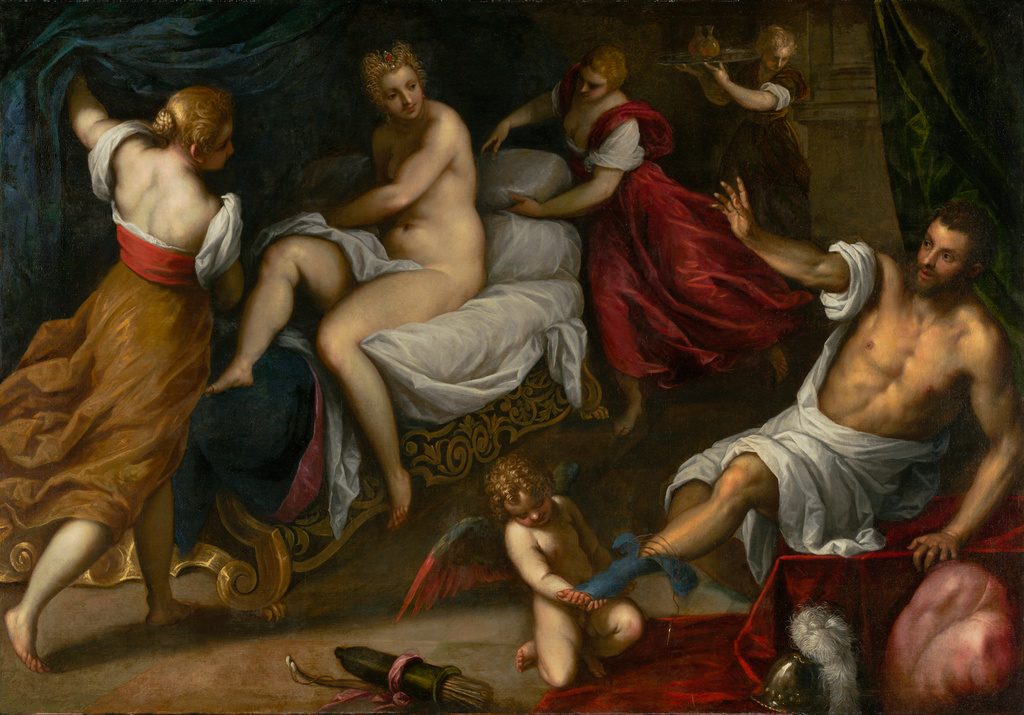While it may not seem all that important at first glance to learn about how the days of the week got their names, it is actually very important from a cultural perspective. As many of the weekdays are named after the gods of various religions, we can learn much about the religious practices of certain cultures by analyzing why and how certain gods and goddesses were associated with certain days. Religion and culture are closely intertwined to the point where the English words culture and cult are derived from the same word. Studying a culture’s religion can provide insight into how inhabitants of that culture thought and how they viewed the world.
The word Sunday is, appropriately enough, named after the sun. 1 Specifically, it is derived from the Old English word sunnandæg. Sunnandæg itself is the combination of two words, sunnen, which means “sun,” and dæg, which means “day.”2
The word Monday is derived from the Old English word monandæg, which combines two other Old English words: mona, which means “moon,” and dæg, which, as mentioned above, means “day.” In this respect, Monday is much like the word Sunday in that Monday references the moon whereas Sunday references the sun.3
The word Tuesday is derived from the word Tysdagr, which references the god Tyr. Tyr, also rendered as Tiw or Tiu, is the Norse god of war and justice. The words for Tuesday in other languages also reference other gods of war from various mythologies. For example, in Latin, the word for Tuesday is dies Martis, which means “day of Mars.” Mars is Tyr’s counterpart in the Roman pantheon, being the god of war for the Romans, as well as “protector of Rome.” 4
Wednesday is derived from the Old English word wodnesdæg, referencing the god Woden.5 Woden is also known as Wodan and Wotan, but he is most commonly known by the name of Odin. Due to the multiple different “archaeological and literary sources” surrounding Odin, it is hard to tell what “his exact nature and role” was in the Norse pantheon, though much like Tyr, he is a god of war and poets, as well as the “protector of heroes.” He is commonly depicted as a one-eyed elderly man with “a flowing beard.” In Latin, the name for Wednesday is dies Mercurii, referencing the Roman god Mercury, who Odin was identified as by the Roman historian Tacitus.6 Mercury, also known as Mercurius, is the Roman “god of shopkeepers and merchants, travelers and transporters of goods, and thieves and tricksters.” He is often considered the Roman counterpart to the Greek god Hermes and both have a role as messenger within their respective pantheons.7
Thursday is derived from “Thor’s-day,” referencing the name of Thor, Norse god of thunder.8 Thor is commonly depicted in Norse mythology as an extremely strong, red-haired, “great warrior,” and the son of Odin in some traditions. He possessed a magical hammer named Mjollnir and is fated to die while killing “the world serpent Jormangund” during the Ragnarok, the destruction of the “world of gods and men” in Norse mythology. The Latin term for Thursday is dies Jovis, which means “Jove’s day” and references Jupiter/Jove, the head Roman god that “Thor was sometimes equated with.”9

c. 1670 or 1680-1700 | Courtesy Getty Gateway Images
The word Friday is derived from “Frigg’s-day,” which references the name of the Norse goddess Frigg, also known as Freya, Frea, or Friia. Frigg is Odin’s wife and patron of love, specifically “marriage and fertility.”10
The word Saturday is derived from the Middle English word saterday and the Old English word sæterndæg, the latter referencing Saturn of Roman mythology. Saturn, also called Saturnus in Latin, was the Roman god of “sowing and seed.” He is also identified as Cronus, one of the Greek Titans and father of Zeus. Zeus drove Saturn/Cronus out of Mount Olympus, but Saturn is also said to have given “his people agriculture and other peaceful arts” and “ruled Latium” during a peaceful and prosperous “golden age.”11
Even today, religion has an effect on our culture. Whether it is through our overall sense of morals or through the expressions and idioms we use, religion and religious practice often affect how we think, even if we are not consciously aware of it. How much more would religion have affected older cultures, many of whom were more openly pious than ours? As American culture puts an emphasis on multiculturalism, it is colored by other cultures and often takes aspects of them into itself. Therefore, through understanding other cultures, we can learn more about our own.
- Encyclopedia Britannica, 2016, s.v., “Week.” ↵
- “Sunday | Definition of Sunday by Merriam-Webster,” Merriam-Webster, accessed November 18, 2016, http://www.merriam-webster.com/dictionary/Sunday. ↵
- “Monday | Definition of Monday by Merriam-Webster,” accessed November 18, 2016, http://www.merriam-webster.com/dictionary/Monday. ↵
- Encyclopedia Britannica, 2016, s.v., “Tyr.” ↵
- “Wednesday | Definition of Wednesday by Merriam-Webster,” Merriam-Webster, accessed November 18, 2016, http://www.merriam-webster.com/dictionary/Wednesday. ↵
- Encyclopedia Britannica, 2016, s.v.,“Odin.” ↵
- Encyclopedia Britannica, 2016, s.v.,“Mercury.” ↵
- Encyclopedia Britannica, 2016, s.v.,“Week.” ↵
- Encyclopedia Britannica, 2016, s.v., “Thor.” ↵
- Encyclopedia Britannica, 2016, s.v., “Frigg.” ↵
- Encyclopedia Britannica, 2016, s.v., “Saturn.” ↵



66 comments
Aaron Jaramillo
Very interesting article. I never knew where the names of the days of the week originated from. It is very interesting that they come from different gods and that even in different languages and cultures the names of the days of the week are very similarly related to the same gods or objects. Great article.
Edelia Corona
Awesome article! I never really thought much about why the days of the week were named. I learned a lot from reading your article and I love how you pose a question in your conclusion of how much more of our culture is influenced by others. It is definitely something to think about and take into account. Thank you for sharing!
Kimberly Rios
Great article! I have always had some curiosity of how the names of the weeks came to be, and after reading this I am very intrigued. To think that the names of the week are the same worldwide and they were derived from the Nordic Gods is extremely interesting. I would love to learn more about this but your article was very informative, good job!
Salvador Rodriguez Gomez
It was pretty cool reading about the gods and religions that the names for each day of the week are derived from. I had no idea there was so much more meaning behind the names tho I did know a little bit of the meanings for Thursday and Friday. It’s really intriguing that various aspects of our culture and everyday life have connections to other ancient religions and cultures.
Christopher Repka
This was a really interesting article! I did not know that many of our weekday names originated from old English words, I figured that most of them were directly from Latin. Beyond the generally interesting topic, your article was well written, too. Your perspective on cultural understanding was very interesting, but I do wish you would have expounded more explicitly on how understanding these week day names might help us understand different cultures better. Thanks for the good read!
Rafael Ortiz Salas
This article was very interesting. I never knew where the origin of the names of the week came from, it was really interesting to learn about it. I found it cool that the names they use after some Gods are also superhero characters in the marvel universe. Very cool article, good job. 🙂
Ivanna Rodriguez
Wow! I learned so much from your article. I never knew where the names of the week came from. It was interesting to learn that they come from Norse mythology. I appreciated the amount of detail you put into explaining each day. Great Job! Keep up the good work!
Analina Devora
Wow! I never put much thought into how the days of the week got their names. I figured it derived from mythological gods and goddesses but it is very interesting learning about the background behind it. Very well written and very well researched. I learned something new!
Kassandra Guillen
This is a very interesting article, for I was never made aware of how the days of the week were named and their relation to Gods of various religions. It is quite fascinating to learn where the names were derived from and the meaning behind them. Thank you for sharing this with us!
Joshua Tinajero
Wow it is very interesting in how the weekday’s names came to be, and how they have great meanings in many different cultures. It is also amazing to see how the meanings of these words correlate between different religions and cultures. Great informative article, keep up the amazing work!